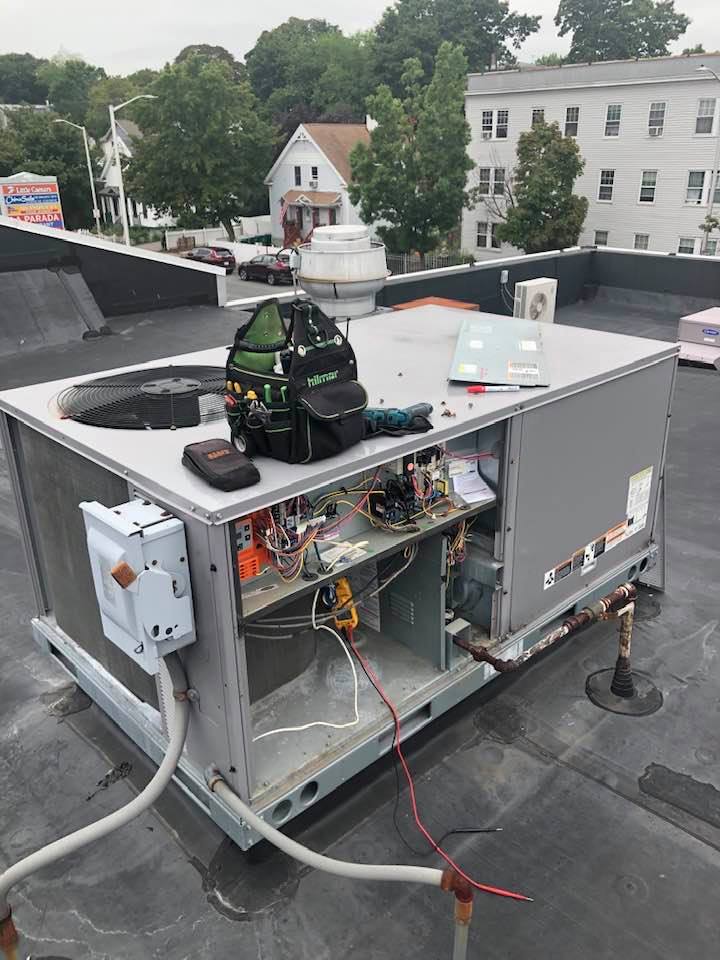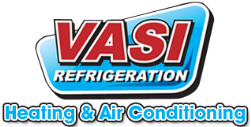With the kids back in school and fall and winter holidays quickly approaching, now’s the perfect time to do some routine maintenance on your heating and cooling system.
Learn how to prepare your air conditioner for a long hibernation as well as tips for waking up your heating system without any problems. The last thing you want is to have your furnace break down in the middle of winter.
Heating and cooling accounts for around half (48%) of the total energy use in a typical home, easily making it the largest energy expense (U.S. DOE).
By putting a little effort into making sure your HVAC system is working properly, you will significantly reduce your HVAC system’s energy consumption. Make the switch from cooling to heating as smooth as possible. Below are some insightful tips on fall HVAC maintenance.
Fall HVAC Maintenance Tips
Consider Replacing Your HVAC System
 You should consider the age of your heating system and your current energy bills before you do anything. Heating systems that are more than 10 years old are only 40-60 % efficient. If your HVAC system is on its last legs, seriously consider replacing the entire HVAC system. Today, gas furnaces available in the market boast of efficiency ratings that are as high as 97%.
You should consider the age of your heating system and your current energy bills before you do anything. Heating systems that are more than 10 years old are only 40-60 % efficient. If your HVAC system is on its last legs, seriously consider replacing the entire HVAC system. Today, gas furnaces available in the market boast of efficiency ratings that are as high as 97%.
Learn why you should probably replace your cooling and heating systems at the same time.
Clean or Replace Air Filters
Dirty HVAC filters restrict airflow and reduce the entire efficiency of the HVAC system. If you have not cleaned or changed the air filters of your system for a while, now is the perfect time to do it. This should be done every 1-3 months.
To be safe, inspect your air filter every 30 days to see if it is dirty and clogged. Check your owner’s manual for the best air filter to use in your system. Choose an air filter with a minimum MERV rating of 7. Make sure to have plenty of back-ups so you don’t have to run to the store every month or two.
Clean and Unblock All Vents and Registers
Go around your home and make sure all of your return and supply vents and registers are clean and clear. Double check that none of them are blocked by rugs, furniture, or closed off in any way. Learn why you should never close any of your vents and other common HVAC misconceptions.
While you are checking to make sure nothing is blocking your vents, take some time to clean them of any dust that may have gathered around the area. Cleaning your vents helps prevent the dirt and dust from entering your HVAC system and circulating around your home.
Reprogram the Thermostat
When you start transitioning from cooling to heating, it’s a good idea to reprogram your thermostat. You can save a lot of money with a smart or programmable thermostat — you just have to make sure it’s set properly.
Lower the thermostat temperature for the times you aren’t at home to save some money and energy. You can save “1% for each degree if the setback period is eight hours long” (U.S. DOE).
Home Heating Fire Prevention
Heating equipment causes around 56,000 home fires every year. Make sure your family is safe from home heating accidents by following these heating safety tips:
- Keep anything that could burn at least 3 feet away from all heating sources, including fireplaces, space heaters, furnaces, and cooking equipment.
- Never leave a space heater unattended.
- Do NOT plug space heaters into extension cords.
- Never use your oven to heat your home or dry clothes.
- Install smoke and carbon monoxide detectors on every level of the home and outside of each sleeping area.
- Do not use any heater with a damaged cord or plug.
- If you smell gas, turn off the appliance immediately (if you can) and evacuate the building. Then, contact the fire department and your local gas company.
- Chimneys and flues should be cleaned regularly. Use a proper screen/guard to prevent embers from flying out of the fire.
Professional HVAC Inspection
Have you serviced your heating, ventilating and air-conditioning (HVAC) system for the winter period? Whether you are a homeowner or a property manager, you will need to find a reliable HVAC professional to help you service your HVAC system. A well maintained and serviced HVAC system is highly efficient in both its functionality and energy consumption.
A professional contractor should inspect your HVAC system at least twice a year, once in the fall for the heating system and once in the spring for the cooling system. The inspection is meant to detect any potential problems and ensure that the HVAC system is working as efficiently as possible.
The HVAC inspection involves checking filters, inspecting electrical switches, belts, contacts, motors, safety switches, gas pressure, and refrigerant levels.
